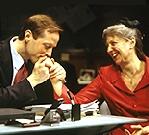SEARCH CurtainUp
REVIEWS
FEATURES
NEWS (Etcetera)
ADDRESS BOOKS
Broadway
Off-Broadway
BOOKS and CDs
OTHER PLACES
Berkshires
London
Los Angeles
Philadelphia
Elsewhere
QUOTES
TKTS
LETTERS TO EDITOR
FILM
LINKS
MISCELLANEOUS
Free Updates
Masthead
NYC Weather
Endpapers
by Les Gutman
|
This is a business, not a summer house at the beach. ---Thomas McCormack |

T. Hopper and B. Dixon
(Photo: Joan Marcus) |
McCormack tells us that his structural model was a Shakespearean history play, but for me the closer cognate for his setup seems to be Lear. The cast for Endpapers -- eleven actors deep! -- includes the patriarch of the "house," Josh Maynard (William Cain); his real-life daughter, Sara (Maria Thayer), devoted to her father if not particularly to his business; and the two shining young stars in his work family, the hard-working Griff (Bruce McCarty), who is all about substance, and the devious Ted (Tim Hopper), indifferent to "product" but focused on the bottom line. Both men have acolytes: Cora (Pippa Pearthree) and Grover (Neil Vipond) in Griff's camp, Sheila (Shannon Burkett) and Kay (Beth Dixon) in Ted's. We also meet the banker (Alex Draper) and, later, two of the firm's writers, portrayed by Greg Salata and Oliver Wadsworth.
It probably will surprise no one that publishing houses contain people of unquestionable integrity and others bereft of scruples, or that the art versus commerce debate that we conduct regularly in the theater has an analog in the world of books. What is unanticipated is that, despite an entertaining and at times gripping production that is undertaken with exceptionally soundness, Mr. McCormack -- writing his first full length play, post-retirement -- has shared with us little more by way of insight. His characters are as thin as the stock of a mass market paperback, and his resolution veers so far off into the land of the silly that it can't be anything but a letdown.
This is not to suggest that McCormack does not write credibly or that he fails to enliven his work with situations no doubt borne of his years of experience. Particularly nice are the series of letters from would-be and often disgruntled writers that open both acts (read in voice-over and responded to by Griff). In his interview, the playwright admits to a fondness for Stoppard and Frayn, among others, and with the play's literary setting, the opportunities for repartee are seemingly endless. Too often, however, McCormack's wit fails to scale such heights, trafficking instead in recognitional humor and vulgarity that, sadly, brings him the greatest laughs.
The assembled cast is an impressive and balanced one in which everyone is effective and even the most power-hungry characters are not permitted to break out of what is, and should be, an ensemble piece. Much of this credit goes to Pamela Berlin, whose direction is flawless. Reading Laura Hitchcock's review of the original LA production, linked below, reveals that there has been some character pruning in the intervening year; I would have gone a step beyond and trimmed the two writers who appear late in the second act: both well-realized stereotypes that add little but delay to reaching the play's ending.
Among the production's excellent design elements, Neil Patel's set deserves special commendation: he brilliantly squeezes the cubicle of each character around the perimeter off the CEO's large office/conference room.
LINKS
Interview with playwright Thomas McCormack
CurtainUp LA Review of this play under its original title, House
|
Endpapers
by Thomas McCormack Directed by Pamela Berlin with Shannon Burkett, William Cain, Beth Dixon, Alex Draper, Tim Hopper, Bruce McCarty, Pippa Pearthree, Greg Salata, Maria Thayer, Neil Vipond and Oliver Wadsworth Set design: Neil Patel Costume Design: Amela Baksic Lighting Design: Rui Rita Sound Design: Ken Travis Running Time: 2 hours, 30 minutes with one intermission Variety Arts Theatre, 110 Third Avenue (13/14 Sts.) Telephone (212) 239-6200 Opening June 23, 2002, open run TUES - SAT @8, WED, SAT @2, SUN @3; $45-65 Closed 10/27/02 Reviewed by Les Gutman based on 6/26/02 performance |

6,500 Comparative Phrases including 800 Shakespearean Metaphors by CurtainUp's editor.
Click image to buy.
Go here for details and larger image.



